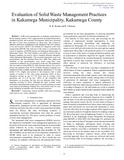Evaluation of Solid Waste Management Practices in Kakamega Municipality, Kakamega County
Abstract
Solid waste management is a challenge, particularly in
the developing countries. This is aggravated by increased urbanization,
population growth and economic development which have increased
the rates of solid waste generation in urban areas. The solution to
effective solid waste management is the adoption of the 3 R’s (reduce,
re-use and recycle) which is the bedrock for integrated solid waste
management (ISWM). The main aim of this study is to determine the
extent of adoption of ISWM practices in Kakamega Municipality of
Kakamega County. The study adopted a descriptive research design.
Random sampling was used to select a hundred different enterprises
within Kakamega Municipality. The research instruments used were
questionnaires and Key Informant Interviews (KII). The validity and
reliability of the questionnaires were tested using Pilot study
conducted on different sets of respondents in the area. The quantitative
data was analysed using SPSS 26, while thematic analysis was used to
analyse the qualitative data. 85.7% of all the enterprises sampled were
commercial with a smaller proportion being educational (7.2%) and
health (7.1%). Eighty nine percent of the enterprises had a small
number of workers (1-50), with a large proportion (46%) of these
enterprises having an age of 5-10 years and an average waste
generation rate of 0-10 kg day-1
. Most of the enterprises had
information on recycling, but this did not influence their choice
regarding recycling of waste. Although the study revealed useful
information regarding behavioural aspects of small enterprises towards
waste disposal, preliminary findings show that inertia could be a key
factor hindering sustainable solid waste disposal practices.

